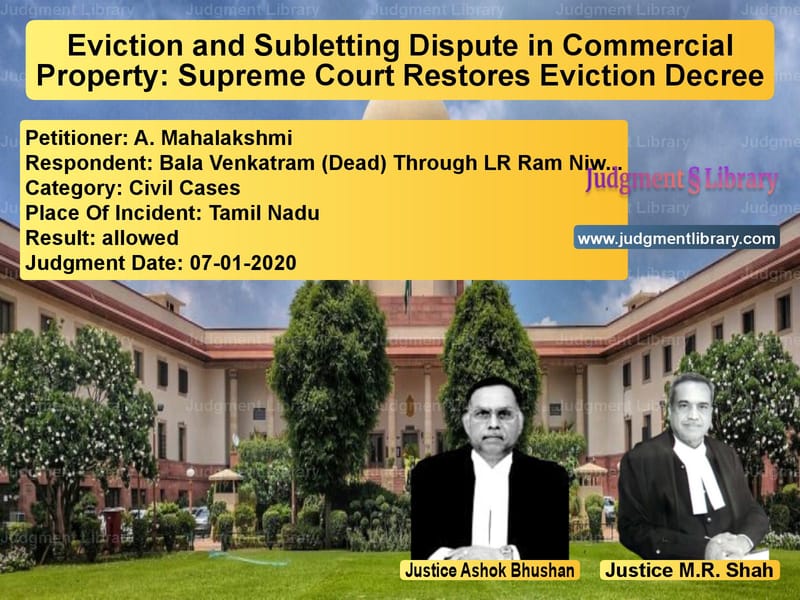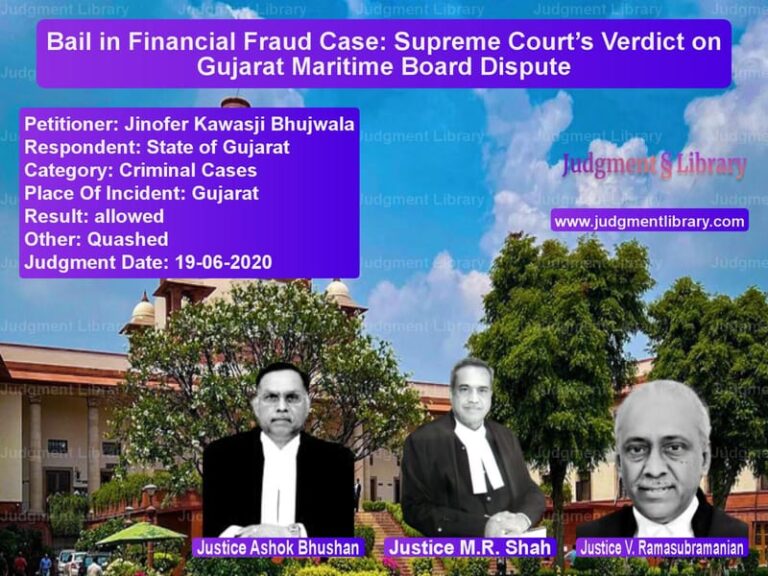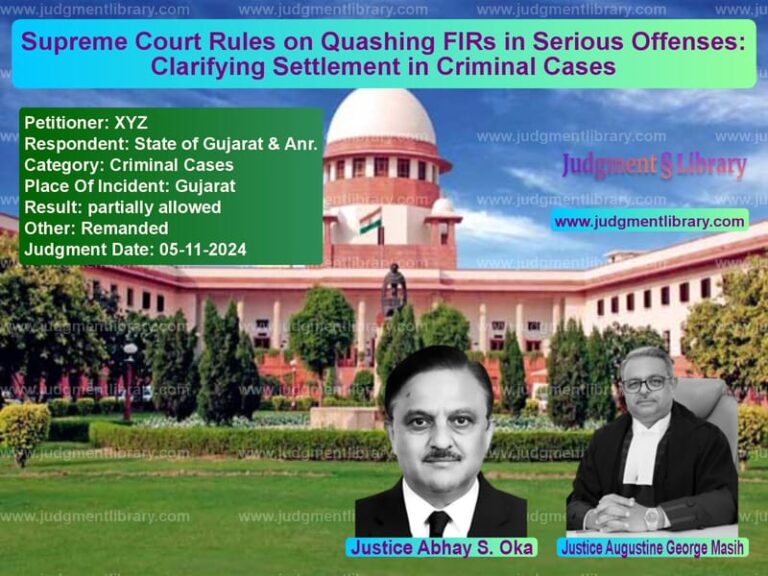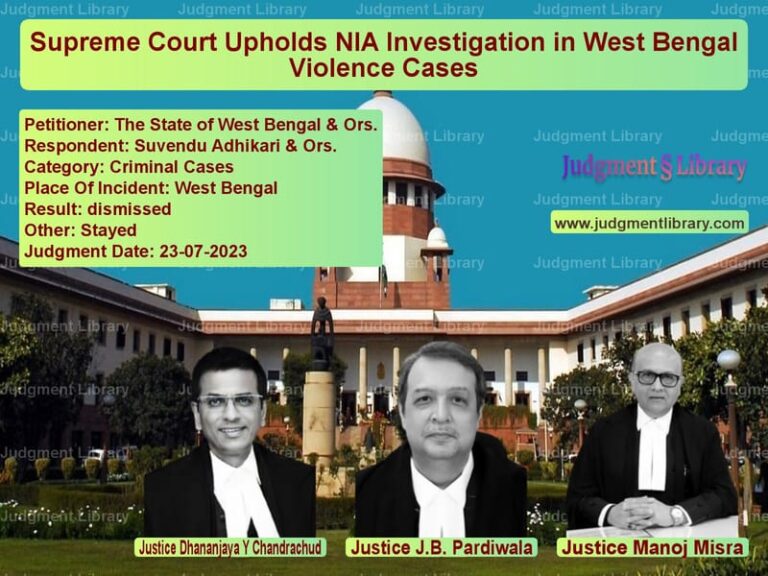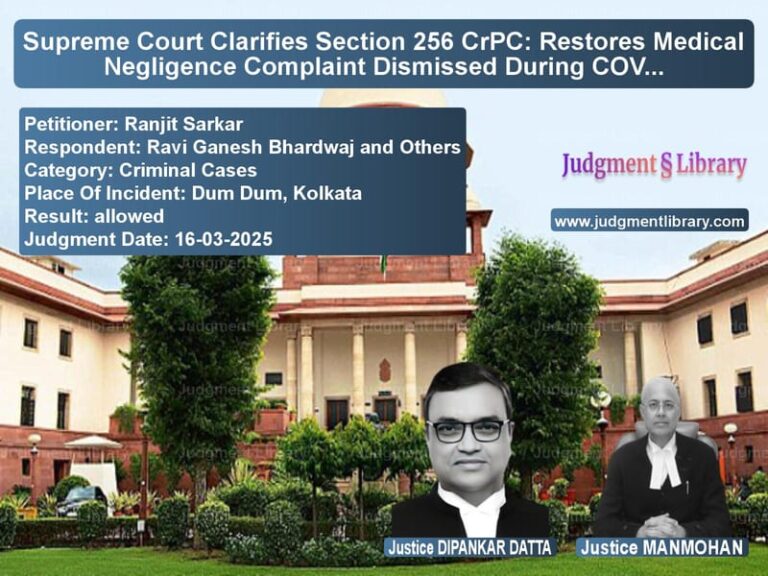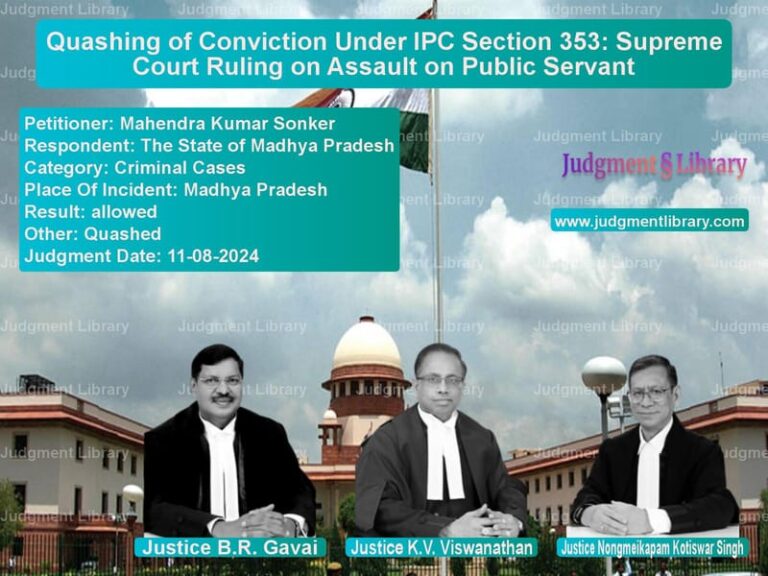Eviction and Subletting Dispute in Commercial Property: Supreme Court Restores Eviction Decree
The case of A. Mahalakshmi v. Bala Venkatram (Dead) Through LR Ram Niwas deals with the eviction of tenants based on subletting and arrears of rent. The Supreme Court, in its judgment dated January 7, 2020, reinstated the Rent Control Appellate Authority’s decision to evict the tenant for subletting the premises to another party without the landlord’s consent. The case clarifies key legal principles surrounding subletting in commercial tenancies, the rights of landlords, and the grounds for eviction under the Tamil Nadu Buildings (Lease and Rent Control) Act, 1960.
This judgment is important for understanding the legal thresholds that must be met to prove subletting and the circumstances under which landlords can seek eviction for non-payment of rent and unauthorized subletting of commercial premises.
Background of the Case
The appellant, A. Mahalakshmi, was the owner of commercial premises that were leased to Bala Venkatram (original tenant) in May 2007 for running ‘Best Mark Super Market’. According to the terms of the rental agreement, the tenant was required to pay a monthly rent of Rs. 11,000, with an advance payment of Rs. 1,00,000. The agreement also stipulated that the tenant could not sublet the property without the landlord’s written consent.
However, by 2009, the name of the business in the rented premises changed from ‘Best Mark Super Market’ to ‘Amutham Super Market’. The appellant alleged that this change in name was not just a business rebranding but a clear case of subletting, where the original tenant transferred the control and possession of the shop to Shahu Hameed, the second respondent (sub-tenant), without informing or seeking approval from the landlord.
The appellant filed an eviction suit against both the original tenant, Bala Venkatram, and the sub-tenant, Shahu Hameed, under the Tamil Nadu Buildings (Lease and Rent Control) Act, 1960, citing subletting and arrears of rent as grounds for eviction.
High Court’s Decision
The High Court, in a revision petition filed by the tenants, quashed the eviction order passed by the Rent Control Appellate Authority. The High Court held that:
- The landlord had failed to prove the subletting allegations beyond reasonable doubt.
- The rental agreement allowed the tenant to run the business under any name without requiring the landlord’s approval.
- There was no evidence to prove that the sub-tenant had exclusive possession of the property.
Based on these findings, the High Court ruled that the eviction petition filed by the appellant should be dismissed.
Arguments by the Petitioner (A. Mahalakshmi)
- The High Court wrongly disregarded the evidence that showed the tenant had transferred the shop to the sub-tenant, which constituted subletting.
- The evidence, including sales tax certificates and the license for the business, was in the name of the sub-tenant, proving that the tenant had part with possession of the premises.
- The Rent Control Appellate Authority had correctly found that subletting had occurred and that the tenant had failed to comply with the terms of the rental agreement.
Arguments by the Respondents (Bala Venkatram and Shahu Hameed)
- The appellant failed to prove that the original tenant had sublet the premises.
- The change of name was part of the original tenant’s business expansion and did not amount to subletting.
- The second respondent, Shahu Hameed, was not running the business independently but as a partner with the original tenant.
- The appellant’s claim that the rent was not paid was not substantiated with proper evidence.
Supreme Court’s Judgment
The Supreme Court, after considering the facts and arguments, ruled in favor of the appellant and set aside the High Court’s decision. The Court found that:
- The original tenant had indeed transferred the possession of the commercial premises to the sub-tenant, Shahu Hameed, which amounted to subletting under the terms of the rental agreement.
- The fact that the sub-tenant had exclusive possession of the premises, as evidenced by the sales tax certificate and the license, indicated that the original tenant had parted with the possession without the landlord’s consent.
- The Rent Control Appellate Authority had correctly upheld the eviction order based on the evidence of subletting and arrears of rent.
- Any attempt by the original tenant to pass off the subletting as a partnership agreement was an afterthought and lacked supporting evidence.
The Court concluded that the appellant, as the rightful landlord, was entitled to evict both the original tenant and the sub-tenant under the provisions of the Tamil Nadu Buildings (Lease and Rent Control) Act.
Legal Precedents Cited
- Associated Hotels of India Ltd. v. S.B. Sardar Ranjit Singh (1968) – Clarified the conditions under which subletting constitutes a ground for eviction in rent control matters.
- G.K. Bhatnagar v. Abdul Alim (2002) – Reaffirmed that subletting involves the transfer of exclusive possession to a third party without the landlord’s consent.
- Celina Coelho Pereira v. Ulhas Mahabaleshwar Kholkar (2010) – Summarized the legal position regarding subletting and the burden of proof on the landlord.
Impact of the Judgment
The ruling has far-reaching implications for landlords and tenants in commercial property disputes:
- It reinforces that any unauthorized subletting or transfer of possession without the landlord’s consent constitutes a breach of the tenancy agreement and can lead to eviction.
- The judgment emphasizes the importance of proper documentation (e.g., sales tax certificates, licenses) to prove possession and control of the premises in subletting cases.
- It highlights that tenants cannot escape eviction by claiming partnership or business expansion if the actual facts demonstrate subletting.
- The case underscores that the tenant’s failure to pay rent, along with evidence of subletting, provides a strong ground for eviction under the Rent Control Act.
The decision restores the Rent Control Appellate Authority’s order and ensures that the rights of landlords to control and manage their properties are protected.
Petitioner Name: A. Mahalakshmi.Respondent Name: Bala Venkatram (Dead) Through LR Ram Niwas.Judgment By: Justice Ashok Bhushan, Justice M.R. Shah.Place Of Incident: Tamil Nadu.Judgment Date: 07-01-2020.
Don’t miss out on the full details! Download the complete judgment in PDF format below and gain valuable insights instantly!
Download Judgment: A. Mahalakshmi vs Bala Venkatram (Dead Supreme Court of India Judgment Dated 07-01-2020.pdf
Direct Downlaod Judgment: Direct downlaod this Judgment
See all petitions in Contract Disputes
See all petitions in Property Disputes
See all petitions in Specific Performance
See all petitions in Judgment by Ashok Bhushan
See all petitions in Judgment by Mukeshkumar Rasikbhai Shah
See all petitions in allowed
See all petitions in supreme court of India judgments January 2020
See all petitions in 2020 judgments
See all posts in Civil Cases Category
See all allowed petitions in Civil Cases Category
See all Dismissed petitions in Civil Cases Category
See all partially allowed petitions in Civil Cases Category

